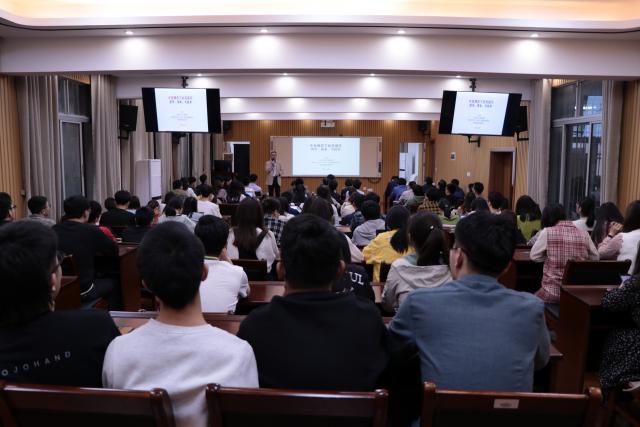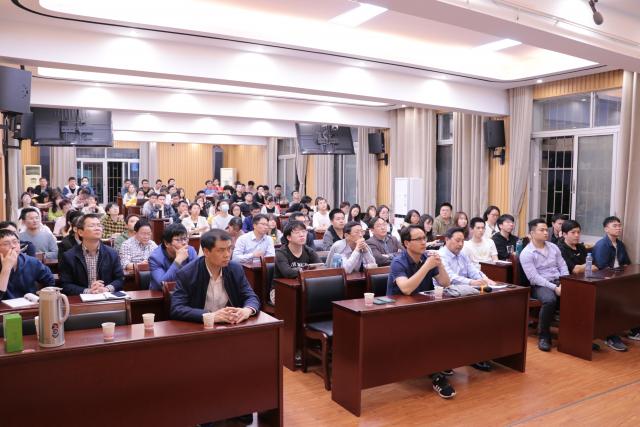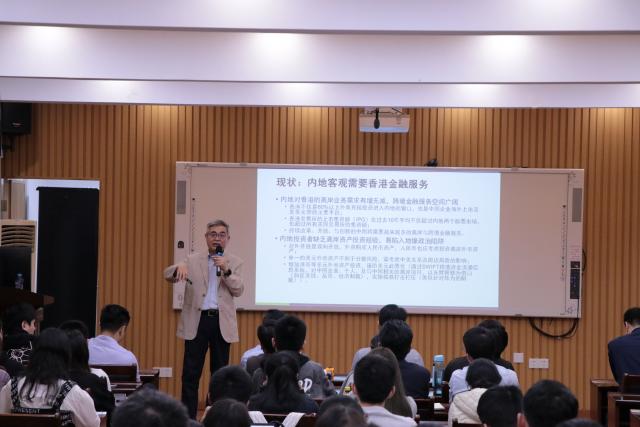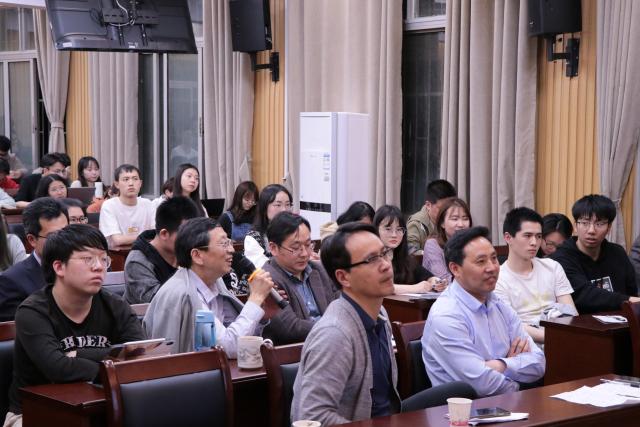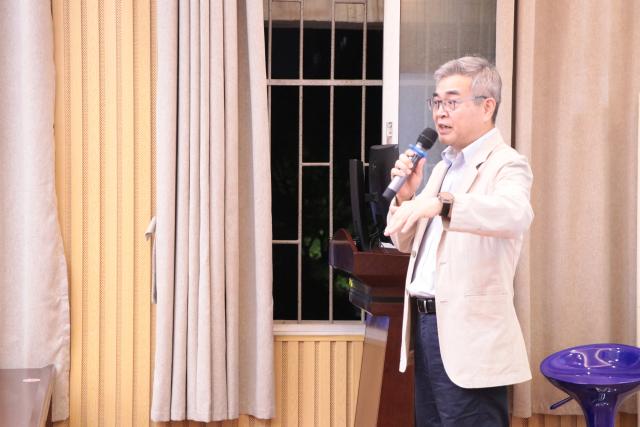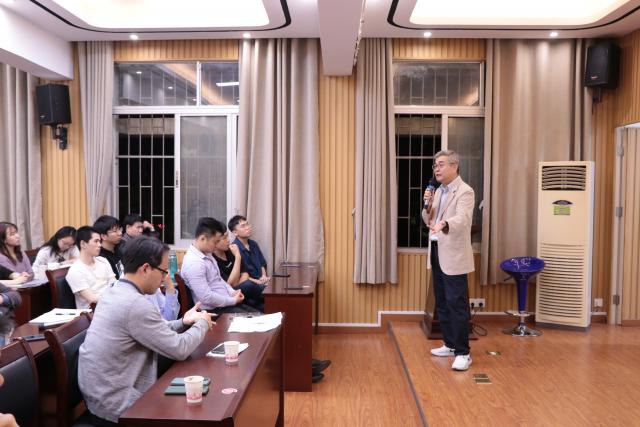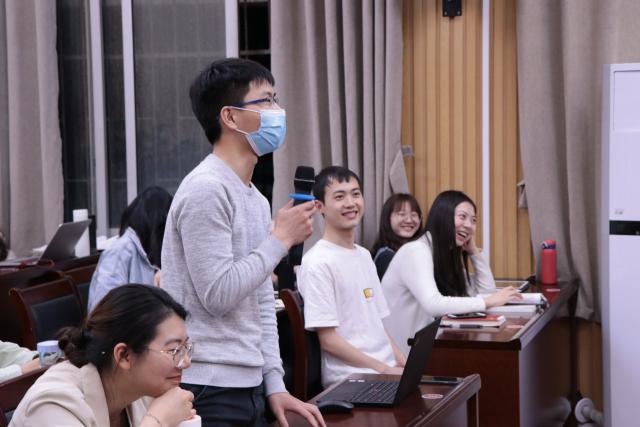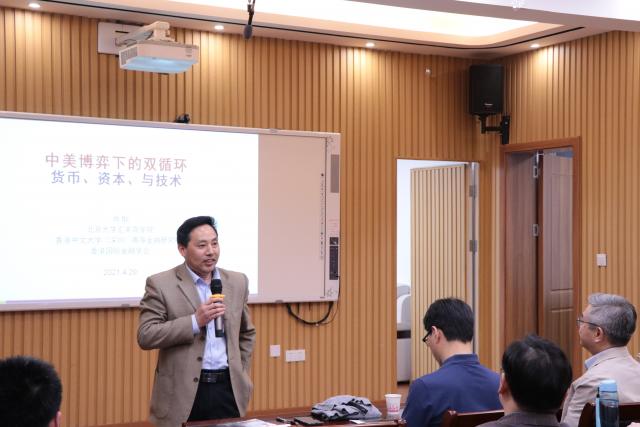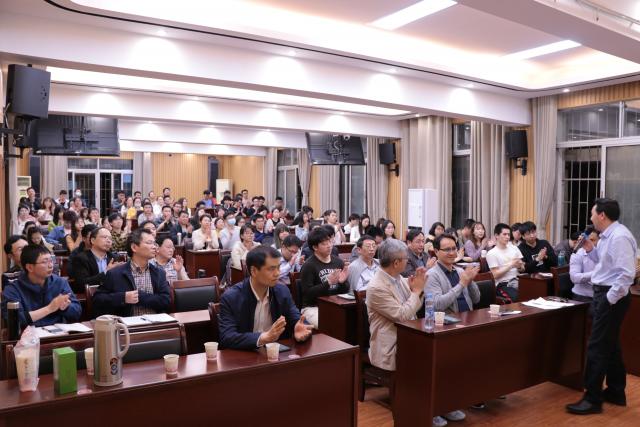| Professor Xiao Geng from Peking University HSBC Business School visited the School of Finance to give lectures |
| 发布时间:2021-05-06 23:48:58 浏览次数: |
|
On the evening of April 29th, Professor Xiao Geng from the HSBC Business School of Peking University visited the School of Finance and gave a special academic lecture entitled The Dual Cycle under the Sino-US Game: Currency, Capital and Technology. The Dean of the School of Finance Gui Hefa presided over the lecture. Associate Deans of the School of Finance Xiao Jun and Liu Xinghua, as well as some college teachers, and graduate students of the School of 2019 and 2020 attended the lecture.
At the beginning of the lecture, Gui Hefa introduced Professor Xiao Geng's appointment and key research directions, and expressed his welcome and gratitude to Professor Xiao Geng for coming to the school to give lectures. In the lecture, Professor Xiao Geng first analyzed China's open and complex national governance system based on Mr. Qian Xuesen's Open Complex Giant System, telling us what China did right in the past and providing a sustainable development path for our future.
Secondly, he compared the differences in growth models between China and the United States based on the tripod model of national capabilities, rule of law, and accountable government. From this perspective, we can have a deeper understanding of the social governance, government mobilization capabilities, and economic growth models between China and the United States. The difference between.
Then, he analyzed the differences between China and the United States from the five perspectives of trade, scale, efficiency, technology, and society. This provides an explanation for our understanding of whether China and the United States will go into a hot war, a cold war or a cold war. In response to this issue, he said that China and the United States will eventually move towards competition and cooperation.
Later, he also proposed the key to the dual cycle. The key to the internal cycle is to enlarge and strengthen the Shanghai onshore international financial center with the RMB as the core. The key to the external cycle is to prevent the risk of the US dollar system being abused and ways to prevent this risk. It is through the Guangdong-Hong Kong-Macao Greater Bay Area + Hainan Free Port + Free Trade Zones across the country to take the lead in establishing a high-quality and accepted offshore economic open system ecological environment, emphasizing the importance of institutional innovation. Finally, he also analyzed the institutional obstacles to the integration of Hong Kong and the Mainland, mainly due to the difference between the two financial systems of the RMB and the Hong Kong dollar. On this basis, he proposed that the breakthrough point for financial innovation in the Greater Bay Area under the dual-cycle strategy lies in the dual-currency parallel service dual-cycle strategy. At the end of the lecture, the teachers and students of the college actively asked questions about the double loop under the Sino-US game. Professor Xiao answered one by one and expressed his willingness to communicate with everyone. Hefa Gui gave a concluding speech at the end, saying that this lecture has very profound enlightenment for our understanding of the double cycle under the Sino-US game, and once again expressed his gratitude to Professor Xiao for coming to give lectures. The atmosphere of this lecture was enthusiastic, and the teachers and students of the college expressed that they have broadened their horizons and benefited a lot.
Speaker introduction: Bachelor of System Science and Management Science from University of Science and Technology of China, Master and Ph.D. in Economics from University of California, Los Angeles. He is currently a professor of Peking University HSBC Business School, deputy director of a think tank, and director of the Maritime Silk Road Research Center; soon to be a professor and director of the Institute of Policy and Practice at the Chinese University of Hong Kong (Shenzhen) Institute of Advanced Finance; concurrently chairman of the Hong Kong Institute of International Finance, Shenzhen Xianxie Member of the Demonstration Zone and Hengqin Free Trade Zone Expert Group. Former Professor of the University of Hong Kong, Advisor of the World Bank, Visiting Fellow of Harvard University, Advisor to the Chairman of the Hong Kong Securities Regulatory Commission and Head of Research Department, Senior Fellow of the Brookings Institution, First Director of the Tsinghua-Brookings Center for Public Policy Research, Columbia University, Beijing The director of the Global Center and the vice president of the Hong Kong Economic Research Institute of International Economics. He has provided policy analysis and suggestions to the central, local and regulatory authorities for a long time. Published 8 books, dozens of journal papers, and hundreds of current reviews in both Chinese and English. |
 |
All right reserved @ 2013 Jiangxi university of
finance and economics finance institure China Postal Code: 330013 E-mail: jxcdjrxy@jxufe.edu.cn Tel:0791-83816792 |
|
